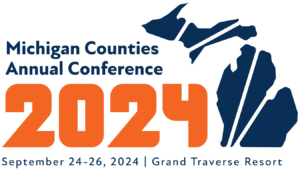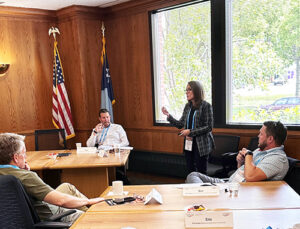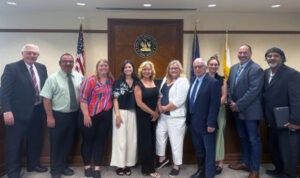MAC releases transparency guidance and additional templates for opioid settlement work
 This week, MAC released a new guidance document focused on supporting counties with transparency associated with opioid settlements. The Michigan County Opioid Settlement Funds: Transparency, Monitoring and Accountability Guide is intended to:
This week, MAC released a new guidance document focused on supporting counties with transparency associated with opioid settlements. The Michigan County Opioid Settlement Funds: Transparency, Monitoring and Accountability Guide is intended to:
- Build on national guidance
- Highlight key areas and practical steps for creating and sharing transparent processes
- Highlight availability and access to information
- Focuses on transparency as a tool to support decision-makers in clarifying how and why decisions were made
The guidance document is framed around three phases in which to consider transparency, including, planning, funding and monitoring. It focuses on three key areas in which transparency can be addressed throughout all phases, including, community inclusion, conflicts of interest and a centralized location for information and public access.
Additionally, MAC has made the following template documents available on the Opioid Settlement Resource Center.
- Public Input/Feedback Session Resolution Template (PDF) (Word) – A resolution for Boards of Commissioners to host community input sessions on their spending plans prior to adoption of a spend plan.
- Spending Plan Adoption Resolution Template (PDF) (Word) – A resolution for Boards of Commissioners to finalize their expenditures.
- Vendor/Contractor Reporting Form Template (PDF) (Word) – A reporting document for monthly, quarterly, or biannual reports from vendors/contractors receiving opioid settlement funds.
- Conflict of Interest Disclosure Form Template (PDF) (Word) – A document for steering committee or request for proposal review committee members to attest to any conflicts of interest.
For mor information or for technical assistance with opioid settlement planning and spending, contact Amy Dolinky at dolinky@micounties.org.
Podcast 83 delves into resources for counties to address growing mental health responsibilities
 A review of the major changes in county mental health responsibilities in recent decades and the challenges now confronting counties in the mental health space are the focus of a new special episode of Podcast 83.
A review of the major changes in county mental health responsibilities in recent decades and the challenges now confronting counties in the mental health space are the focus of a new special episode of Podcast 83.
Richard Carpenter, a specialist with Rehmann, a MAC Premier Partner, sat down with host Stephan Currie to reiterate and expand on points he made during a presentation at this year’s Legislative Conference.
“In the late’ 70s and early’ 80s, the state started to close a lot of the state facilities … and that’s where the counties really started picking up that responsibility,” Carpenter explained.
Carpenter noted several resource opportunities for counties today:
- “We’ve even seen really good partnerships with Mental Health First Aid training that some counties are getting very involved in with their community mental health services programs, so their first responders are ready to identify and respond to those emergencies that might include a behavioral health component.”
- “We do see opportunities with both our state General Fund dollars at the Community Mental Health Services programs and our Medicaid dollars; I can’t stress enough that our Medicaid dollars can help individuals stay out of … incarceration.”
- “There is access through the Michigan Department of Health and Human Services in what they call the Community Mental Health Block grants. And they still have … substance abuse and prevention and treatment block grant dollars.”
“When I look into the future, what are the hot things that I would recommend people kind of keep their ears open for keep their eyes on,” concluded Carpenter, “the no. 1 of them is the (Certified) Community Behavioral Health Clinic. The state of Michigan is putting a lot of dollars into that CCBHC program.”
View the full episode, recorded on June 4, by clicking here.
Previous episodes can be seen at MAC’s YouTube Channel.
And you always can find details about Podcast 83 on the MAC website.
Clock is ticking on registration access to 2024 Annual Conference
 Registration continues online for the 2024 Michigan Counties Annual Conference, being held Sept. 24-26 at the always popular Grand Traverse Resort in Grand Traverse County.
Registration continues online for the 2024 Michigan Counties Annual Conference, being held Sept. 24-26 at the always popular Grand Traverse Resort in Grand Traverse County.
Among the highlights for this year’s event are:
- The 2024 President’s Banquet on Sept. 25 will feature the installation of Wayne County’s Melissa Daub as MAC’s 116th president, followed by entertainment.
- The Welcome Reception on the evening of Tuesday, Sept. 24 will be held in the Exhibitor Hall with beverages and a strolling dinner
- An optional new session called “Women of MAC” will be held the afternoon of Tuesday, Sept. 24
- Plenary sessions on Sept. 25-26 will feature presentations on dealing with personal threats as an elected official, healthy living and the comedic stylings of Danny Adams, “The Facilitator of Fun.”
- MAC’s Annual Business Meeting on Sept. 26 will review and approve MAC’s policy platforms for the coming year.
- Elections will be held for five MAC board seats via regional caucuses on Sept. 25
While the deadline to register for the conference isn’t until Sept. 13, the special hotel room rate will expire on Aug. 23, so county leaders who have yet to make their plans should do so immediately.
For registration questions, first review MAC’s website, then contact Tammi Connell at connell@micounties.org.
Voters endorse almost all county millage requests in August
 Voters across Michigan gave broad approval to millage requests from county governments in the August 2024 primary election.
Voters across Michigan gave broad approval to millage requests from county governments in the August 2024 primary election.
Data provided by the Gongwer News Service shows voters approved 162 of 170 requests on Aug. 6. Voters in Charlevoix County alone approved six different millage renewals and increases for services ranging from recycling and recreation to the county’s medical care facility.
The most common request was for a millage renewal or increase for public safety, with all 44 such requests passing. Of the 31 requests for senior services, 30 were approved.
To see a full list of county-based results, click here.
MDOT seeks comment on 5-year investment plan
 The public may provide input on the Michigan Department of Transportation’s (MDOT) Five-Year Transportation Program (5YTP) now through Sept. 3. The five-year plan is released annually to share MDOT’s funding forecast, upcoming projects, economic impacts and investment strategies for the future.
The public may provide input on the Michigan Department of Transportation’s (MDOT) Five-Year Transportation Program (5YTP) now through Sept. 3. The five-year plan is released annually to share MDOT’s funding forecast, upcoming projects, economic impacts and investment strategies for the future.
See a digital version of the plan here. This year’s plan focuses on multi-modal transportation, public transportation networks, and resiliency strategies. Funds will be dedicated toward repairing and rebuilding 1,355 highway lane miles and replacing and preserving 161 bridges. For local transit, “78 bus agencies, 4 passenger ferry systems, and 38 specialized service providers” will see investments.
MAC encourages county leaders to review and comment on the plan prior to the Sept. 3 deadline.
For more information on MAC’s infrastructure policy advocacy, contact Madeline Fata at fata@micounties.org.
Treasury webinar will focus on fundamentals, best practices
 The Michigan Department of Treasury and Michigan State University Extension (MSU Extension) want to make you aware of our next Fiscally Ready Communities training opportunity. This FREE training is a 90-minute webinar that’s designed to assist appointed and elected officials.
The Michigan Department of Treasury and Michigan State University Extension (MSU Extension) want to make you aware of our next Fiscally Ready Communities training opportunity. This FREE training is a 90-minute webinar that’s designed to assist appointed and elected officials.
The upcoming webinar training will be Thursday, Aug.22, 2024, from 2 p.m. to 3:30 p.m., with additional sessions available on Sept. 16, 2024, Oct. 21, 2024, and Dec. 12, 2024.
“From Fundamentals to Best Practices”
This program focuses on implementing financial best practices, measuring fiscal health, and local government financial management fundamentals. It will include material on reconciling a bank account, how to read and interpret governmental financial statements, audit prep umbrella, how to complete and file an F65 Report, remitting taxes timely, and how to craft an appropriate and effective audit finding Corrective Action Plan. Participants will also receive resources to support best practice implementation and assess their local unit fiscal health.
For more information about Fiscally Ready Communities, please check out Fiscally Ready Communities webpage. This webpage includes Treasury’s 32-page Fiscally Ready Communities Best Practices document, which we encourage all local officials to review.
If you have any questions, email TreasLocalGov@michigan.gov with the subject line “Fiscally Ready.”
 Oct. 15 info event set for broadband funding
Oct. 15 info event set for broadband funding
Local governments and Internet Service Providers (ISPs) can connect and explore partnerships at a matchmaking event on Oct. 15. The Michigan High-Speed Internet office (MIHI) will be hosting “Building Bridges for BEAD” at the Crystal Mountain Resort in Thompsonville.
This is an opportunity for locals and ISPs that are interested in applying for Broadband Equity Access and Deployment (BEAD) funding to learn more about potential collaborations. Public and private partnerships will be paramount to the successful deployment of broadband infrastructure across Michigan.
The forum will be “a fast-paced, guided activity” to initiate conversations and allow for networking. To register or learn more, click here.
 |
 |
 |
 |
MAC on road: Staff visits Clinton and Newaygo counties
MAC staff continue their travel across Michigan and the Midwest this summer (l-r):
- Amy Dolinky and Stephan Currie discussed MAC innovative work on opioid settlement planning with county association executives at a gathering in St. Paul, Minn., this week.
- Samantha Gibson and Madeline Fata attended Newaygo’s board session this month, which included reports from the Area Agency on Aging of West Michigan (AAAWM), Sheriff Bob Mendham and Newaygo’s Parks Department. After the meeting, the MAC duo met with Newaygo Chair and MAC Board Director Bryan Kolk.
- Deena Bosworth, Gibson and Fata attended a Clinton board session in late July and then toured the county’s jail facilities. The Board adopted a resolution in support of their local Community Mental Health entity regarding Conflict Free Access and Planning, supported by MAC and linked on our website.
New NACo program to teach county leaders about conflict resolution
 America is more polarized than ever before. Tensions exist in all sectors, and especially across government and between county governments and communities. Public meetings are sometimes veering out of control, highlighting the urgency for county leaders to develop strategies and skills to bridge divides and collaborate across differences. County leaders are uniquely trusted by the American people to solve local problems.
America is more polarized than ever before. Tensions exist in all sectors, and especially across government and between county governments and communities. Public meetings are sometimes veering out of control, highlighting the urgency for county leaders to develop strategies and skills to bridge divides and collaborate across differences. County leaders are uniquely trusted by the American people to solve local problems.
In September, Convergence and the National Association of Counties (NACo) are offering county leaders a one-of-a-kind eLearning experience to build their capacities to address these tensions, to bridge divides and to collaboratively solve problems in their community.
The Convergence eLearning Program is an eLearning course that improves county leaders’ capacity to bridge divides, resolve conflict, convene and engage stakeholders and collaboratively solve problems.
Why should I participate in the Convergence eLearning Program?
County leaders are uniquely positioned to solve complex and contentious problems in their communities. This course will improve your capacity to effectively communicate during conflict, to identify common interests and goals, and to use collaborative problem-solving skills and processes to address complex issues in your community.
What kind of commitment will the Convergence eLearning Program require?
The Convergence eLearning Program will include up to six hours of coursework to be completed on your own time and at your own pace. Convergence is also offering 2-3 optional virtual meetings for additional coaching and practice.
As part of this pilot program, participants will be asked to complete a short, online evaluation about their experience.
For more information and to sign up, click here.
 Staff picks
Staff picks
- The devil is in the (financial reporting) details (RouteFifty)
- Michigan is no. 1 in nation for land contracts (Pew Trusts)
- Small towns are paying remote workers to move in (RouteFifty)
- Great Lakes’ worst invasive species ranked in new study, from zebra mussels to grass carp (Fox 2 Detroit)
